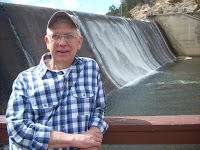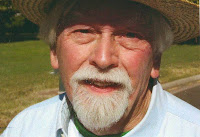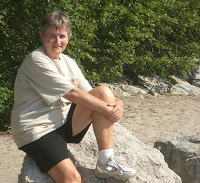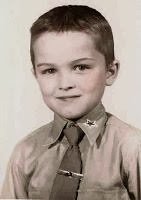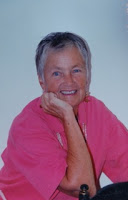I will, before long, I expect; I’m rapidly losing other senses. My hearing is not too bad, but I don’t seem to smell the wet grass or the salty ocean with the strength I did as a child. Fresh strawberries and tomatoes right off the vine sure don’t taste as good as they once did, and my eyesight is battling the effects of glaucoma, so I have little reason to expect my sense of touch not to deteriorate. My mother had terribly inadequate blood circulation, leading to frequent complaints of not being able to feel her hands and feet, or feel with them. She would put me to work peeling potatoes, slicing bread, shelling peas or folding the linens, because, she said, she could not feel what her fingers might be up to. After she cut herself twice and then dropped our best kitchen knife on the stone kitchen floor where it broke, she was only allowed anywhere near a knife on really hot days – rare events in my pre-global-climate-change England. I don’t seem to have inherited that problem, but my Beautiful Betsy has exactly the same thing so before long I shall probably be called upon to perform all our household chores involving sharp utensils.
My dad lost touch. Sadly, it was not a problem with his fingers and toes but with his mind; his very being. Through dementia he lost touch with everyone and everything, including himself.
I first noticed some confusion on a visit home when he was in his early seventies – a little younger than I am now. I mentioned my concern to Mum but she shrugged it off with, well, Dear, I’m sure our minds aren’t quite as sharp as they once were. But she exhibited none of it, I noticed, and in fact she never did and was sharp as a tack till the day she died. I, of course, was living in Colorado and only saw them once a year or so, though out of necessity my visits became more frequent and of greater duration as they aged. The next time I returned, after this particular trip, I was aghast at my father’s mental deterioration. It was harrowing; heartbreaking.
He floated in and out, drifting from lesser to greater confusion and back again, all the time knowing he was losing touch. At one stage he held his wrist towards me, tapping at his watch – a much-valued possession. He gazed at it, then looked at me with tears and a look of such anguish in his eyes that I almost burst into tears myself, but of course I knew I must not.
‘I can’t remember,’ he faltered.
‘What is this? How do I make it work? What does it do?’
‘Oh .. um … nothing much …’
I ran my fingers gently over it. I had to put some cheer in my voice.
‘It sure is a beautiful thing, isn’t it? I tried, desperately.
‘It is,’ he agreed. And smiled.
Not many visits later I returned to see him safely settled into a memory care facility. By then it was easier on all of us. He no longer drifted in and out of differing cognitions. He had no idea who I was or who Mum was or who he was. He no longer struggled with what his watch was for.
He seemed remarkably at peace, so Mum and I were able to find peace for ourselves.
Right now, I am losing touch myself, though not, thank you God, in the way my dad did; at least not yet. Rather, I make a conscious effort to lose touch. I can only inhabit this current socio-political reality for a limited amount of time. I simply have to escape. If Agent Orange can inhabit a reality that is all of his own making, then surely, I can escape to my own alternate reality on occasion? I have a collection of home-made VCR tapes, mostly of ancient Brit sitcoms. Some of these shows are really pretty bad, but in my alternate reality the worse they are the better I enjoy them. So, most evenings I head for the basement TV, descending to my alternate reality as I say to Betsy. Though to be honest even bad Brit sitcoms reach a higher standard than this current American reality show in which we find ourselves, so in fact I am rising up to my alternate reality.
Margaret Atwood says –
‘You may not be able to alter reality, but you can alter your attitude towards it, and this, paradoxically, alters reality. Try it and see.’
Sorry, Margaret, I’m a fan of yours but I tried it and I didn’t like it. I reserve the right to lose touch.
© February 2018
About the Author
I was born and raised in England. After graduation from college there, I moved to the U.S. and, having discovered Colorado, never left. I have lived in the Denver-Boulder area since 1965, working for 30 years at IBM. I married, raised four stepchildren, then got divorced after finally, in my forties, accepting myself as a lesbian. I have been with my wonderful partner Betsy for thirty years. We have been married since 2013.

